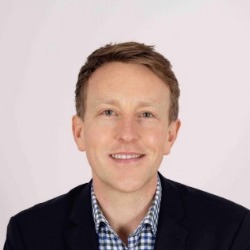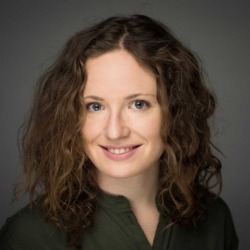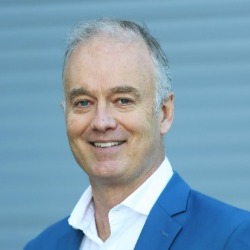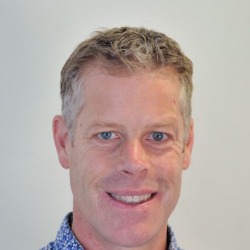University of Otago
Osteoarthritis Summit
Keynote speakers
Dr Andrew Briggs

School of Physiotherapy, Curtin University
Andrew Briggs combines a career of research and ‘on the ground’ activity in health policy and systems, and clinical practice. This unique portfolio equips him with skills and real-world insights into health systems strengthening from the clinical coalface through to system-level reform.
His work focuses on health equitable systems strengthening for people with musculoskeletal health conditions and persistent pain across the life course.
He holds a full Professor position at Curtin University, WA; is a practising physiotherapist; and is a senior consultant to the World Health Organization in musculoskeletal health and healthy ageing.
Dr Stephanie Filbay

Musculoskeletal and Sports Medicine Research Stream, University of Melbourne.
Drawing on her lived experience of ACL injury and extensive research in the field, Dr Filbay is recognised for promoting evidence-based management of ACL injury and developing strategies to improve outcomes for patients.
She has presented her research over 80 times to a variety of stakeholders, chairs and serves on national and international committees, has supervised 30 individuals at various career stages and received numerous awards, scholarships, and grants for her research.
She was recently awarded an NHMRC Investigator Grant to fund five years of research aimed at improving outcomes for people with ACL injury and post-traumatic knee osteoarthritis.
Follow her research updates on Twitter/X: @stephfilbay
Professor David Hunter 
Sydney Musculoskeletal Health, Kolling Institute, University of Sydney and Rheumatology Department, Royal North Shore Hospital.
Professor Hunter is a rheumatologist clinician-researcher whose primary research focus is clinical and translational research in osteoarthritis.
He is ranked as the leading expert in the world on osteoarthritis on expertscape.com, is the section editor for UpToDate osteoarthritis, the Editor in Chief for Osteoarthritis and Cartilage, and has over 600 publications in peer-reviewed journals.
He is co-Director of Sydney Musculoskeletal Health and leads the osteoarthritis team at the Kolling Institute who are dedicated to improving our understanding of osteoarthritis and the quality of life for those who suffer from this prevalent disabling disease.
Additional speakers
Haxby Abbott
Professor Haxby Abbott is Director of the Osteoarthritis Aotearoa Research Network, and the Centre for Musculoskeletal Outcomes Research based in the University of Otago Medical School.
His Management of Osteoarthritis research programme conducts clinical trials, outcomes research, cost-effectiveness modelling, and implementation and evaluation of new health delivery models.
Ricky Bell
Kō Ngātokimatawhaorua tōku waka
Kō Ruapekapeka rāua kō Hikurangi ngā maunga
Kō Taumarere kō Te Raparapa ngā awa
Kō Akerama rāua kō Matawaia ngā Marae
Kō Ngāti Hine kō Te Aupōuri kō Te Rarawa kō Ngāti Hau ki Whangarei kō Ngāpuhi nui tonu ngā Iwi
Kō Kopa, kō Livingstone, kō Kawati, ngā ingoa whānau tūturu
Kō Ricky Bell tōku ingoa
Dr Ricky Bell (ia/he/him) is from Te Tai Tokerau who initially obtained his undergraduate degree in physiotherapy from the University of Queensland, and subsequently a master’s in manipulative physiotherapy from the University of Otago.
With almost thirty years in clinical roles, over the last decade his interests have diversified to include specialist research, allied health leadership, governance, tertiary teaching, workforce development, regulatory and advocacy roles.
Through the support of Hapū Whānau, he was honoured to be the first Māori to be awarded a PhD from the School of Physiotherapy at the University of Otago in 2018. His current substantive role is as a senior advisor for Te Aka Whai Ora, Te Manawa Taki.
He is a strong believer in success enabling success, with aspirations to build on the privileges afforded to him and facilitate others along similar and newer pathways.
Andrew Connelly
Andrew Connelly is a General and colorectal surgeon and is currently the Acting Chief Medical Officer for Te Whatu Ora Counties.
He has a long history of roles in system improvement, regulation and clinical governance having chaired the Medical Council for five years and recently chaired the Planned Care Taskforce to address waiting times.
He spent 2021 seconded to the Ministry as Chief Medical Officer and has previously held roles to aid and improve struggling services in several DHBs.
Outside Medicine he is a passionate football fan, grandfather and collector of written military history.
Ben Darlow

Ben Darlow is a musculoskeletal physiotherapy specialist practising in Wellington and an Associate Professor in the Department of Primary Health Care and General Practice at the University of Otago Wellington.
Ben’s key research interests are the assessment and measurement of health beliefs about common musculoskeletal conditions, understanding how these beliefs have been influenced and the impact that these have on well-being, and designing, testing, and implementing interventions to improve knowledge, health care delivery, and outcomes.
He is currently leading Te Tauwhiro Turi mā te Rongoā - Knee Care for Arthritis through Pharmacy Study (KneeCAPS) that explores the impact of funding community based care for people with knee osteoarthritis.
Ben is committed to increasing involvement people with lived experience of health conditions or health care service use in the design, conduct, and dissemination of research. He is co-chair of the Osteoarthritis Research Partnership Panel.
Ben Darlow
Ben Darlow is a musculoskeletal physiotherapy specialist practising in Wellington and an Associate Professor in the Department of Primary Health Care and General Practice at the University of Otago Wellington.
Ben’s key research interests are the assessment and measurement of health beliefs about common musculoskeletal conditions, understanding how these beliefs have been influenced and the impact that these have on well-being, and designing, testing, and implementing interventions to improve knowledge, health care delivery, and outcomes.
He is currently leading Te Tauwhiro Turi mā te Rongoā - Knee Care for Arthritis through Pharmacy Study (KneeCAPS) that explores the impact of funding community based care for people with knee osteoarthritis.
Ben is committed to increasing involvement people with lived experience of health conditions or health care service use in the design, conduct, and dissemination of research. He is co-chair of the Osteoarthritis Research Partnership Panel.
Jillian Eyles
Dr Jillian Eyles is a physiotherapist at the Northern Sydney Local Health District and early career researcher at the Kolling Institute and Sydney Musculoskeletal Health, University of Sydney.
Jillian’s research program is focused on the development and evaluation of strategies designed to support the implementation and adoption of best-evidence osteoarthritis care, and the outcomes of structured osteoarthritis management programs. Her work also extends to designing strategies to support the de-implementation of low-value osteoarthritis management options that should no longer be used.
Jillian collaborates closely with health professionals, consumers and policy partners in her projects which have attracted >$5.7 million in competitive funding.
Professor David Gywnne Jones
Professor David Gwynne Jones is a consultant Orthopaedic Surgeon in Dunedin specialising in complex primary and revision hip and knee arthroplasty.
He was Clinical Director of Orthopaedic Surgery in Dunedin from 2009 – 2019 and was the Clinical lead on a large Ministry of Health project the Orthopaedic Patient Pathway Programme aiming to improve access to elective orthopaedic surgery.
His MD (Otago) thesis ‘Managing the demand for elective orthopaedic surgery: challenges, strategies and outcomes in New Zealand’ was based on multiple publications arising from this work with a focus on non-operative and surgical management of hip and knee osteoarthritis.
He is a member of the NZOA Research and Outcomes committee and the NZOA Education committee. When not working he enjoys mountaineering and multisport racing.
Martin Kidd
Martin is Clinical Lead of the Southern Community Orthopaedic Triage Service (SCOTS).
Based in Dunedin, this non-surgical pathway for people with persisting shoulder or knee pain is the first publicly-funded, privately-provided pathway for OA patients of its kind in New Zealand.
SCOTS’ primary aim is to provide timely access in the community for appropriate non-surgical care by appropriate health professionals.
Martin has extensive experience in NZ and Australia in acute and chronic musculoskeletal condition management in the public, private and educational contexts.
He resides in Milton with his wife and large garden (in that order of importance).
Mathew Kiore
Mathew Kiore is an active member of our Otago and South Island Māori community, with a wide range of portfolio’s including Co-Chair of the Dunedin Postvention group, Founder of ‘Kia Whai Hina’ (Māori Suicide Prevention Group), Cultural Educator, United Nations Otago Executive Board Member, and board member of Te Kura Kaupapa Māori o Ōtepoti.
Mathew is a Rongoa practitioner and passionate advocate. His life and career have been all about looking after people, as Principle Advisor Service Design, Oranga Hinengaro at Te Aka Whai Ora.
Equity and Cultural Humility are area he has often focused on during his career; as a Youth Justice Program co-ordinator for Te Hou Ora Whanau Services; as CEO of Kokiri Training Centre; as a whanau member at Kura; and in the parenting space through Poipoia te mokopuna.
Mathew was born in Invercargill and is of Ngāti Maniapoto & Ngāti Rora ancestry. He is a lead-by-example, hands-on person who enjoys the outdoors, sharing his mahinga kai (Hunting, Fishing and Diving) and rongoa skills with whanau.
Dr Richard Marcharg
Richard Macharg is a Queenstown GP with a special interest in musculoskeletal medicine and orthopaedics that has been well satisfied by work in a ski resort and adventure town.
He has been an ACC GPSI, a GP teacher and chief executive of a large, rural general practice.
He is now a Clinical Lead at WellSouth Primary Health Network heading the Fracture Liaison Service and ACC GPMRI and Concussion Management Pilot projects.
Sarah Mitchell
I have been the Executive Director Allied Health Scientific and Technical in the Bay of Plenty District Health Board since March 2019. In the previous year I was the Physiotherapy Professional Lead.
I represent the National Directors of Allied Health on the newly established National Musculoskeletal Advisory Group. This Group was established as a result of Te Whatu Ora’s National Planned Care Reset and Restore Plan.
Prior to these positions I held numerous positions within the Scottish Government, latterly the National Programme Director for the Allied Health Professions (AHPs) Active and Independent Living Programme (AILP). This Government policy and the previous National Delivery Plan were aspirational strategies aimed at transforming healthcare at a national level. A key delivery of this programme was the transformational National Musculoskeletal Redesign.
Dr Meredith Peddie
Dr Meredith Peddie (PhD) is Senior Lecturer in the Department of Human Nutrition at the University of Otago.
Before beginning her teaching role in 2020, Dr Peddie held two Research Fellowships from the National Heard Foundation of New Zealand, that supported her research on the health benefits associated with interrupting prolonged sitting with short bouts of movement.
More recently this research has been supported by funding from the HRC and OMRF.
Her teaching in the Department of Human Nutrition focuses on the links between diet and noncommunicable diseases, and last summer she was involved in supervising a summer research project around the benefits of weight loss in people with osteoarthritis.
Hamish Reid
Hamish is an NZ-based Sport and Exercise Physician and Fellow of ACSEP and FSEM in the UK.
He is fortunate to have active roles across the full remit of SEM: he practices at Forte Sports in Christchurch, is team doctor for Crusaders Rugby, works in physical activity education and public health leadership as the Clinical Director of Moving Medicine and continues academic work as a visiting researcher at Sheffield Hallam University.
He has led the development of Moving Medicine, a global not-for-profit initiative committed to developing the knowledge, skills and systems required to integrate person-centred physical activity support into routine healthcare.